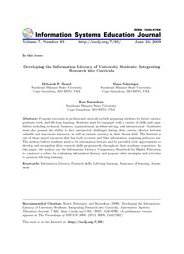Volume 7
Volume 7, Number 63 |
June 24, 2009 |
Abstract: Program outcomes in professional curricula include preparing students for future careers, graduate work, and life-long learning. Students must be equipped with a variety of skills and capabilities including technical, business, organizational, problem-solving, and interpersonal. Graduates must also possess the ability to face unexpected challenges during their careers, discern between valuable and inaccurate resources, as well as sustain currency in their chosen field. The Internet is one of those mixed resources that has both accurate and false information, requiring judicious use. The authors believe students need to be information literate and be provided with opportunities to develop and strengthen their research skills progressively throughout their academic experience. In this paper, the authors use the Information Literacy Competency Standards for Higher Education to construct a rubric for evaluating information literacy and propose other strategies and activities to promote life-long learning.
Keywords: Information Literacy, Research skills, Life-long learning, Assurance of learning, Assessment
Download this issue: ISEDJ.7(63).Beard.pdf (Adobe PDF, 19 pages, 905 K bytes)
Preview the contents: Beard.j.txt (ASCII txt, 49 K bytes)
Recommended Citation: Beard, Schwieger, and Surendran (2009). Developing the Information Literacy of University Students: Integrating Research into Curricula. Information Systems Education Journal, 7 (63). http://isedj.org/7/63/. ISSN: 1545-679X. (A preliminary version appears in The Proceedings of ISECON 2008: §3712. ISSN: 1542-7382.)
